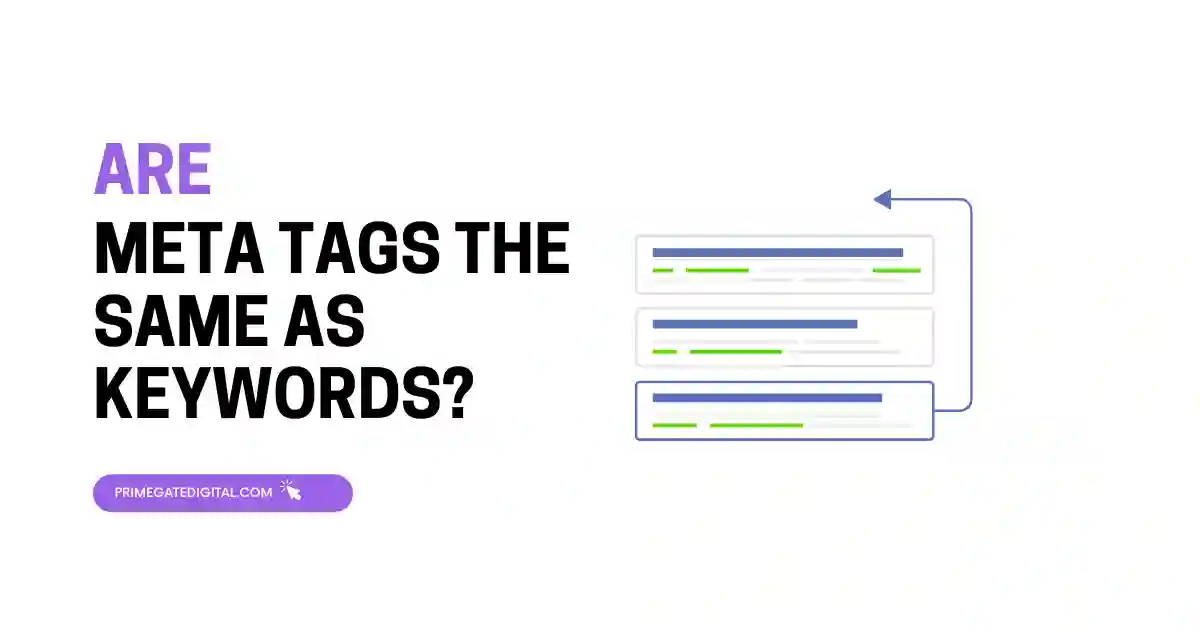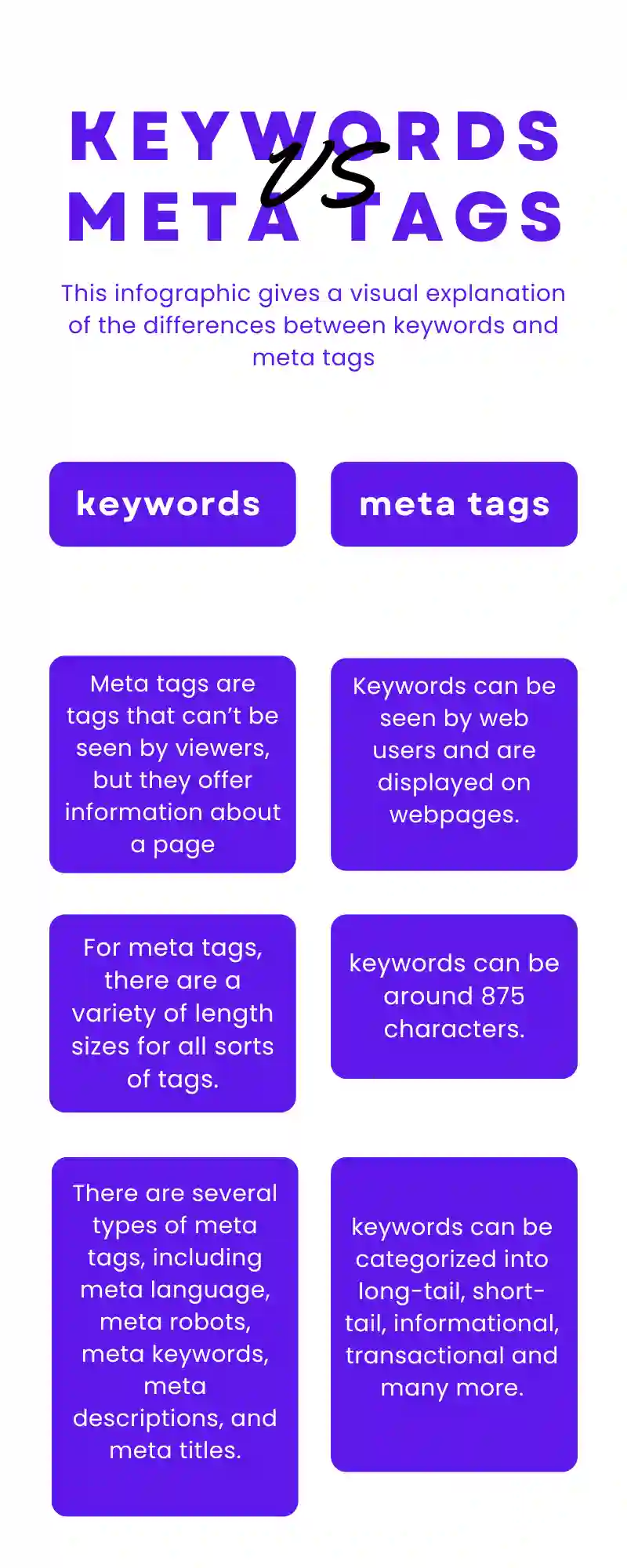Last updated on December 10th, 2023 at 07:30 pm
Keywords are search phrases that help web users discover your page or content on search engine results pages (SERPs).
Meta tags, on the other hand, are HTML codes displayed to search engines on your page to offer more information. Meta tags and keywords are not the same.

Meaning of Keywords and Meta Tags
Before we explore the difference between both terms, let’s explain what meta tags and keywords mean.
Keywords:
This can be likened to the central idea of your content. If your blog content is about how to bake a pie, your keywords will probably be “bake pie,” “how to bake pie,” or “pie baking.”.
Keywords can be short-tail (comprising of one to two words) or long-tail (comprising of three words or more). While “pie baking” is a short-tail keyword, “how to bake a pie” is an example of a long-tail keyword.
Meta tags are text snippets that summarize the content of a page. They are displayed in search results pages and HTML code. You should be sure to add at least one or two keywords to them to improve your SEO.
If your headline is properly written, there’s a chance it can function as your meta tag. There are a lot of tools that can assess the effectiveness of your headline, like Monster Insight and CoSchedule.
There are three important elements of your web pages where meta tags can be placed:
- Meta descriptions: Descriptions show up in your search engine results pages to provide a brief summary of the content of your page.
- Meta Keywords: These are keywords that are implemented in the HTML codes of the website. Web users can’t see this.
- Page Titles: They briefly offer information about the content of a page.

Key Differences between Keywords and Meta Tags
Definition
Meta tags are tags that can’t be seen by viewers, but they offer information about a page, while keywords can be seen by web users and are displayed on webpages.
Length
For meta tags, there are a variety of length sizes for all sorts of tags.
For instance, titles have to be a minimum of 70 characters, while descriptions have to be around 150 characters.
On the other hand, keywords can be around 875 characters.
Types
There are several types of meta tags, including meta language, meta robots, meta keywords, meta descriptions, and meta titles.
On the other hand, keywords can be categorized into long-tail, short-tail, informational, transactional, and many more.
Keywords and Meta Tags Best Practises for SEO
Here are a few tips to help you improve your meta tags and keyword tactics.
Always Conduct Keyword Research.
Keyword research is compulsory to get your keywords to cater to your business offerings.
Even when your service of “pie baking” or product of “chicken pie” is quite apparent, you wouldn’t want to begin utilizing keywords with zero value for your visitors.
For example, if you market high-quality, designer female clothing items to a specific demographic, you would want to avoid keywords such as “cheap female clothes” or “budget female dress”.
Even though those keywords drive traffic, site visitors won’t get what they want and might even have the notion that your business is deceitful and untrustworthy for utilizing keywords that don’t accurately reflect your products.
There are many keyword research tools you can use today.
Put Yourself in the Buyer’s Shoes
Another method for formulating keyword ideas is to have a buyer’s mindset.
What are the kinds of search phrases you want your business to be associated with?
This way, you can come up with several keywords that precisely match your services and products.
Create a Keyword List
You need to start your keyword research with a list of topics that relate to your brand.
Formulate 5 to 9 topics that you need to drive traffic for. Next, conduct research on individual topics, coming up with a list for them all.
Organize them into a list and separate them according to categories. This will add value to your digital marketing strategy.
Familiarize Yourself with Long-Tail Keywords
People who shop on the internet are precise about their search terms, and you can leverage long-tail keywords.
The issue is that generic search terms such as “female clothes” might be very difficult to rank for compared to long-tail terms such as “designers female clothes in Houston.”
Fortunately, long-tail keywords tend to have better conversion rates compared to generic search terms. This should be very convincing.
Pay attention to Identical Keyword Terms
After getting several long-tail keywords with decent traffic, experiment with identical search terms.
For instance, if “designer female dress” is doing numbers, make use of terms such as “designer women’s outfit” and “luxury female clothes”.
Be Sure to Add Meta Tags on Every Page
Ensuring each page of your site is enhanced with meta tags takes a lot of work off the search engine’s agenda.
Instead of crawling through your site to figure out what it’s all about, meta tags give search engines a clear outline of what visitors can expect to find.
And the more apparent your company’s offerings are, the more likely a visitor will convert.
Don’t Abuse Keywords or Meta Tags
Our final tip is to avoid abusing meta tags and keywords.
Keyword abuse includes keyword stuffing or using deceptive keywords to gain visitors, even if they have little or nothing to do with your offerings.
Meta tag abuse can involve the same practices, including stuffing your website code with meta keywords that have nothing to do with your brand.
This all goes back to our point about thinking like a buyer. If you were searching for gourmet dog food, you wouldn’t want to be taken to a page that has the opposite.
Are Meta Tags the Same as Keywords FAQs
Is the meta keyword still a ranking factor?
The simple answer is “no”. Google admitted in 2009 that it had stopped using meta keywords as a ranking factor for websites on SERPs.
For this reason, I will advise that you shouldn’t waste your resources on implementing meta keywords on your site.
What are some important meta keywords tips?
- Ensure your keywords or search phrases are separated via commas.
- Never duplicate keywords or phrases.
- Position your primary keywords at the start of your list.
Should I add keywords to the meta description?
Meta description is not a ranking factor.
This implies that adding specific keywords to your meta description will not impact your SERP rank.
But since meta descriptions are available for potential visitors to read before clicking, they can influence your traffic.
Do meta keywords still matter?
Meta keywords are obsolete and no longer relevant. They can’t improve your search engine rankings.
At times, when they are used, they can negatively affect your SEO strategy because they can be regarded as spam by search engines.
What factors should I consider when selecting keywords for SEO?
The four important factors for keywords include relevance, competition, search volume and difficulty.
What is an example of a meta tag that can impact SEO?
A common example is the alt tag. It helps you add descriptive text to pictures and video clips in your content.
This lets search engines easily discover your page, which is highly important.
Do I have to add meta descriptions on every page?
Yes, for every page you want to show up on the Google search result page, a meta description must be included.
This is to summarize the page content for searchers, improving your click-through rates.
- Write a unique description for every page on your website.
- Ensure details added have relevance to the page
- Be sure to use quality descriptions.
How can I find popular keywords?
You can discover popular keywords through the use of keyword research tools. Good examples of these include Google Keyword Planner, ahrefs, Buzzsumo and Ubersuggest. They are effective in showing you the search behaviour of people as well as the performance of keywords.
Alt tags are categories of meta tags that allow you to include a description for pictures and videos for search engine crawlers to “read”.
It is also called an image optimization meta tag or alt attribute.
You can easily use it to give information about an image so crawlers have insight into it.
Are keywords still important?
Yes, keywords are highly important for SEO because searchers still utilize keywords in the form of search terms to look for specific information online.
What is the ideal number of keywords for SEO?
Stick to one primary keyword per page. While it is possible to target multiple keywords for each page, ensure that one is the primary or most important. The others are categorized as secondary and assist in adding depth to your content.
How can I optimize my page URL?
Here are some ways to carry out URL optimization:
- Ensure it is brief and to the point.
- Remove all extra words and keep the URL slug simple.
- Be sure to add relevant keywords.
- Desist from stuffing keywords.
- It should be separated with hyphens.
- Avoid duplicating slugs, as it can negatively affect your page SEO.
Conclusion
Your goal when using elements like meta tags and keywords is to drive targeted traffic to your web pages.
In this article, I have explored several ways you can add keywords and meta tags to attract a qualified audience to your site for conversion to take place.
 PrimeGate Digital is a Result Driven Blog that strives to go beyond ‘Conventional Digital Marketing’ through digital innovation and performance marketing. We have experience working with world class brands and products.
PrimeGate Digital is a Result Driven Blog that strives to go beyond ‘Conventional Digital Marketing’ through digital innovation and performance marketing. We have experience working with world class brands and products.
